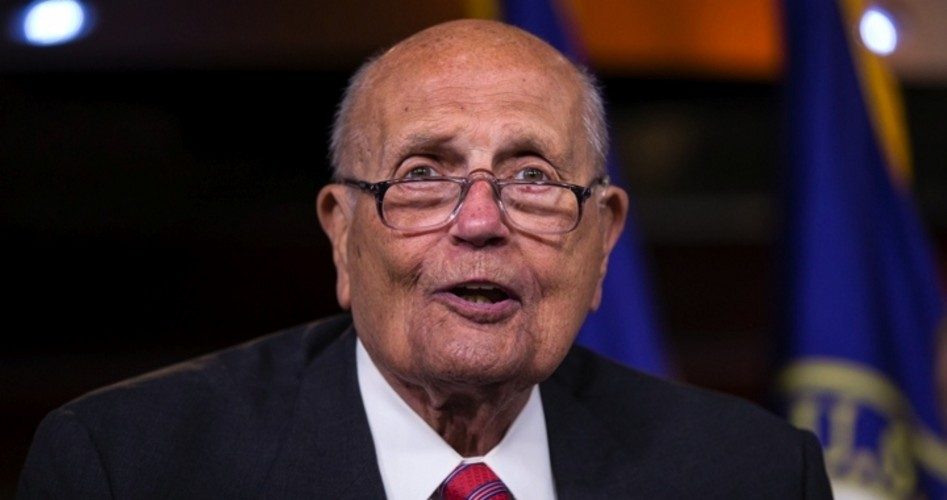
Born in Colorado Springs in 1926, John Dingell (D-Mich.) took over from his father as a U.S. representative from Michigan in 1955 and has never stopped promoting his father’s progressive agenda. On February 24, Dingell announced that he would not seek a 30th term partly due to age and partly due to acrimony. In his prepared remarks he was all sweetness and light:
Around this time every two years, my wife Deborah [28 years his junior] and I confer on the question of whether I will seek reelection.
My standards are high for this job. I put myself to the test and have always known that when the time came that I felt I could not live up to my own personal standard for a Member of Congress, it would be time to step aside for someone else to represent this district.
He sang a different tune to the Detroit News:
I’m not going to be carried out feet first. I don’t want people to say I stayed too long….
It’s become very hard because of the acrimony and bitterness both in Congress and in the streets.
The Dean of the House (a title granted to the longest-running member) probably had no idea that he, along with his father, are partly responsible for creating that atmosphere of acrimony and bitterness through the combined 80 years of pushing the American people around with extra-legal and unconstitutional laws and trampling of precious rights. As Fredric Bastiat expressed it so well more than 150 years ago, when the law is used as a bludgeon, people eventually get angry. When used as such a tool, said Bastiat, “the law destroys … the rights of the person by way of slavery, liberty by way of oppression [and] property by way of plunder.”
Dingell and his father, John D. Dingell, Sr., certainly used the law as a hammer to force citizens to comply with their progressive agenda. As early as 1933, Dingell, Sr., pushed for national health insurance under President Roosevelt. John T. Flynn called him a “New Deal stalwart.” He had no problem illegally arresting and jailing innocents, promoting in a letter dated August 18, 1941 to the president the incarceration of 10,000 Hawaiian Japanese Americans, using them as hostages to ensure the “good behavior” of the Japanese government.
Immediately following the attack on Pearl Harbor, Dingell, Sr. accused Admiral Kimmel and General Short of negligence and dereliction of duty, long before learning the facts behind the so-called “surprise” attack.
Once in place following a special election in 1955 to replace his father, Dingell, Jr. immediately began promoting national health insurance, offering a bill at the start of each legislative session in support of socialized medicine. He worked with the Johnson administration to pass civil rights legislation and Medicare. He once chortled:
It’s hard to believe that there was once no Social Security or Medicare. The Dingell family helped change that.
My father worked on Social Security and for national health insurance, and I sat in the chair and presided over the House as Medicare passed [in 1965].
I went with Lyndon Johnson for the signing of Medicare at the Harry S Truman Library, and I have successfully fought efforts to privatize Social Security and Medicare.
During his 51 years in Congress, Dingell has promoted other parts of the radical progressive agenda tirelessly, including the Wilderness Act, the Endangered Species Act, the Clean Air Act, the Marine Mammal Protection Act, and the National Environmental Policy Act. He even helped write the original Corporate Average Fuel Economy (CAFE) act that has impacted America’s auto industry since 1975. Said Dingell: “I’ve been a busy little boy.”
Dingell is also an internationalist, completely ignoring any constitutional strictures, either domestically or internationally. In an interview with Grist in 2006 he was asked about global warming and governmental attempts to clean the air through federal laws and regulations. His response is instructive:
Is that going to solve the problem? China has an exemption from the Kyoto agreement because it’s classified as a developing country. The Indians are, too. In a meeting about the Kyoto agreement, I asked the Chinese, “How long are you going to be a developing country, before we can expect you to participate in cleaning up?” They looked me in the eye and said, “Dingell, we’re always going to be developing. We aren’t ever going to be a stable, staid, complete society. So we’re never going to be covered by it. We’re just going to go ahead and burn all the damn coal, emit all the carbon dioxide that we want to emit.” And they will very shortly be the biggest emitter in the world….
Now you ask, if we were to terminate all of the burning of coal and all of the production of CO2 in this country, and China and India and Europe and everybody else in the developing world keeps going, I don’t think you’re going to be looking for much in the way of a resolution. This is an international problem.
A statist to the core, Dingell supported any governmental action to enforce compliance with the progressive agenda, even when it threatened to damage his supporters from Detroit. The big three carmakers — Ford, General Motors, and Chrysler — contributed more than $600,000 to Dingell’s reelection campaigns over the years. And yet, when push came to shove, Dingell was easy to shove in the direction of more government, more regulations, and more restrictions on automakers. In November 2007 he compromised with then-Speaker of the House Nancy Pelosi in cobbling together an agreement to raise CAFE standards by an astonishing 40 percent by the year 2020, requiring automakers to meet a new industry standard of 35 miles per gallon for cars, trucks, and SUVs.
When it served his purposes, Dingell used his position as chairman of the powerful House Energy and Commerce Committee to harass Republican appointees to the EPA and the FDA, while ignoring blatant overreach by those departments when they were staffed by Democrat appointees.
At one point his committee was so powerful that four out of every 10 bills presented during his reign from 1981 to 1995 had to pass through his committee. His hubris was unmatched. When asked where his committee’s jurisdiction ended, he merely pointed to a photo of Earth taken from space that he had mounted on the wall behind his desk. Even after Rep. Henry Waxman (D-Calif.) took over as chairman of his committee, Dingell continued to work with him to promote and eventually pass ObamaCare.
Dingell, to his credit, could never get his head around the necessity, promoted by progressives, to disarm the American people. For a number of years he sat on the board of the National Rifle Association (NRA), which routinely gave him its A+ rating for his stand on the Second Amendment.
Overall, Dingell’s — and his father’s — 80-year reign can best be measured by his rating in The New American’s Freedom Index of just 21 out of 100, meaning that of the tens of thousands of votes that he and his father have cast over eight decades, only one in every five of those votes supported the Constitution.
With the end of the father-and-son Dingell reign over, along with its support of the country’s slide into socialism, are brighter days ahead? Maybe not, as Dingell’s wife Deborah, a long-time supporter of and employee with General Motors, announced February 28 that she would jump into the race to replace him, thus raising the possibility that the Dingell reign won’t be ending any time soon after all.
A graduate of Cornell University and a former investment advisor, Bob is a regular contributor to The New American magazine and blogs frequently at www.LightFromTheRight.com, primarily on economics and politics.



